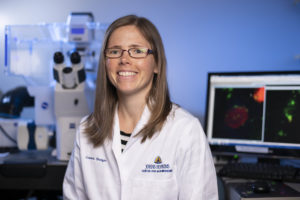 LAURA M. ENSIGN, PhD, the inaugural recipient of the Marcella E. Woll Professorship in Ophthalmology, joined the faculty of the Wilmer Eye Institute in 2014. She received her BS in Chemical and Biomolecular Engineering from The Ohio State University in 2007 and her PhD in Chemical and Biomolecular Engineering from The Johns Hopkins University in 2012. In addition to her primary appointment in Ophthalmology, Dr. Ensign has secondary appointments in the Departments of Chemical and Biomolecular Engineering, Biomedical Engineering, Pharmacology and Molecular Sciences, Gynecology and Obstetrics, Infectious Diseases, and Oncology.
LAURA M. ENSIGN, PhD, the inaugural recipient of the Marcella E. Woll Professorship in Ophthalmology, joined the faculty of the Wilmer Eye Institute in 2014. She received her BS in Chemical and Biomolecular Engineering from The Ohio State University in 2007 and her PhD in Chemical and Biomolecular Engineering from The Johns Hopkins University in 2012. In addition to her primary appointment in Ophthalmology, Dr. Ensign has secondary appointments in the Departments of Chemical and Biomolecular Engineering, Biomedical Engineering, Pharmacology and Molecular Sciences, Gynecology and Obstetrics, Infectious Diseases, and Oncology.
As a member of the Center for Nanomedicine, Dr. Ensign has created several approaches for administering drugs that lead to increased and sustained drug delivery to precisely targeted cells and tissues. Improved drug delivery minimizes unintended side effects, and sustained delivery of drugs reduces the frequency of drug administration, which increases patient compliance and quality of life. Because the basic principles of revolutionizing drug delivery have broad applications for improving human health, Dr. Ensign’s research program includes treatments for ocular diseases, gastrointestinal diseases, cancers, conditions related to women’s health, and microbiome-based disorders.
Although the eye is a relatively accessible part of the human body, the complexities and intricacies of its structures make therapeutic drug delivery particularly challenging. The key structure that makes vision possible, the retina, is highly protected and difficult to access. Thus, treatments for age-related macular degeneration (AMD), for example, which affects the retina, require frequent intraocular injections, typically one to two per month. Patients have difficulty returning to the clinic so frequently and the injections cause temporary vision impairment and pain. An eye drop that could deliver drugs to inhibit the rogue growth of blood vessels in the retina — the biological event that causes vision loss in people with AMD — could revolutionize the treatment of a disease like AMD.
The technical challenge of delivering drugs to the retina via an eye drop, however, makes such a development one of the holy grails of ocular drug delivery. Dr. Ensign is developing a topical gelling eye drop that delivers drugs to the choroid and retina. The material is capable of dissolving even highly water insoluble drugs, often rendering the solution clear, which minimizes obstruction of vision. The material is a liquid at room temperature, and upon application, rapidly spreads to form a thin layer on the ocular surface, where it gels to form a clear, drug-eluting ocular film. Dr. Ensign has co-founded a company with mentor and collaborator, Justin Hanes, PhD, to develop the technology for clinical use.
Dr. Ensign’s work is possible in part because of the unique environment at Wilmer and Johns Hopkins Medicine. The collaborative opportunities available have allowed her to dramatically accelerate the work of her lab toward improving the treatment of ocular diseases. Bridging engineering approaches with identified clinical needs and testing in physiologically relevant models has led to successful translations of her work into clinical treatments for patients.
 LAURA M. ENSIGN, PhD, the inaugural recipient of the Marcella E. Woll Professorship in Ophthalmology, joined the faculty of the Wilmer Eye Institute in 2014. She received her BS in Chemical and Biomolecular Engineering from The Ohio State University in 2007 and her PhD in Chemical and Biomolecular Engineering from The Johns Hopkins University in 2012. In addition to her primary appointment in Ophthalmology, Dr. Ensign has secondary appointments in the Departments of Chemical and Biomolecular Engineering, Biomedical Engineering, Pharmacology and Molecular Sciences, Gynecology and Obstetrics, Infectious Diseases, and Oncology.
LAURA M. ENSIGN, PhD, the inaugural recipient of the Marcella E. Woll Professorship in Ophthalmology, joined the faculty of the Wilmer Eye Institute in 2014. She received her BS in Chemical and Biomolecular Engineering from The Ohio State University in 2007 and her PhD in Chemical and Biomolecular Engineering from The Johns Hopkins University in 2012. In addition to her primary appointment in Ophthalmology, Dr. Ensign has secondary appointments in the Departments of Chemical and Biomolecular Engineering, Biomedical Engineering, Pharmacology and Molecular Sciences, Gynecology and Obstetrics, Infectious Diseases, and Oncology.